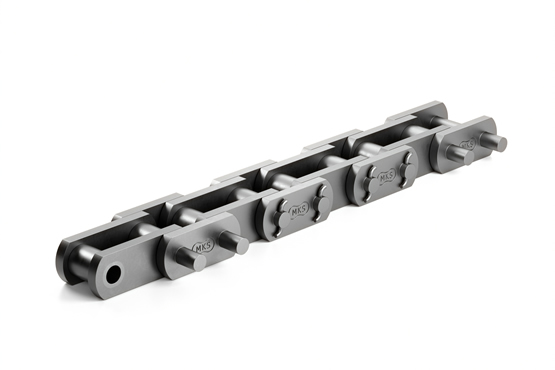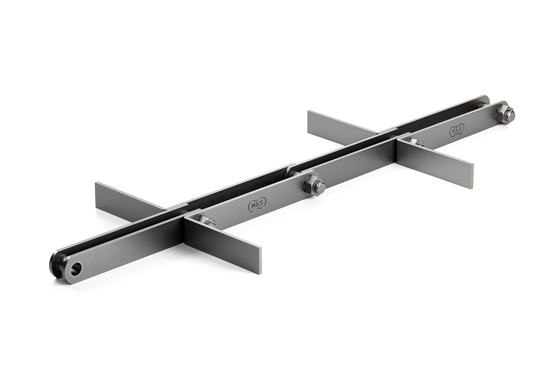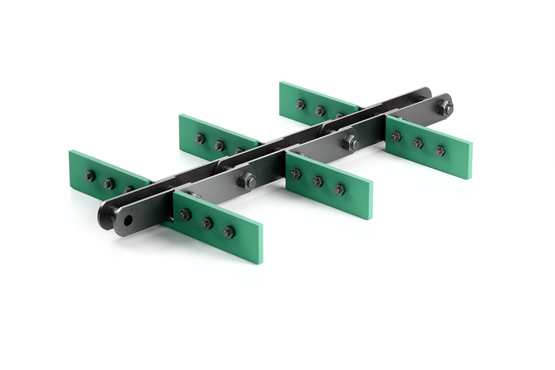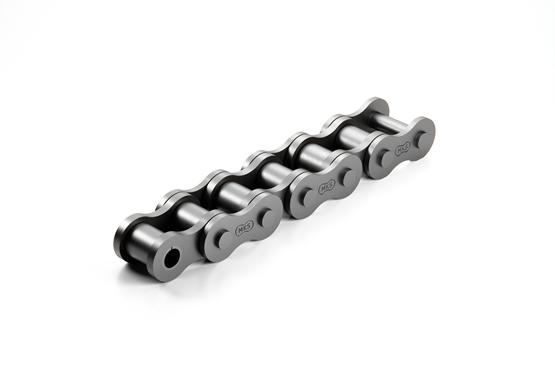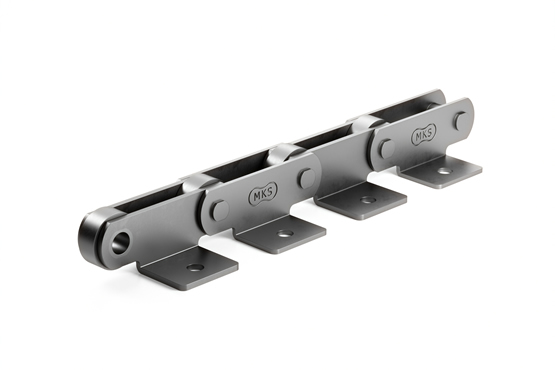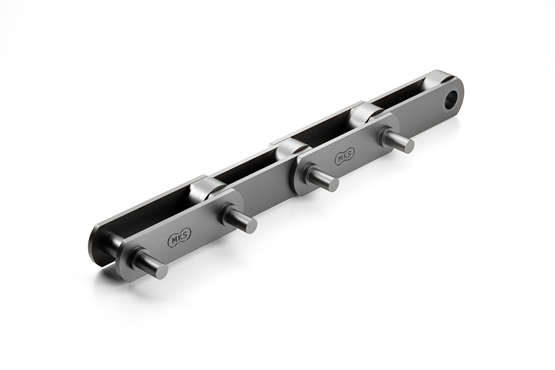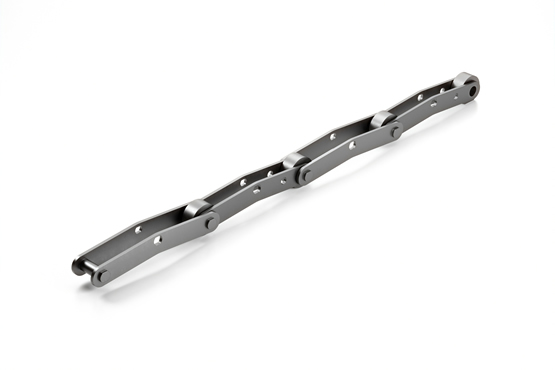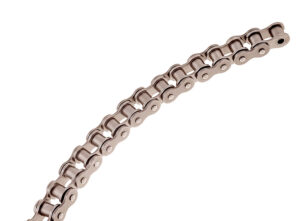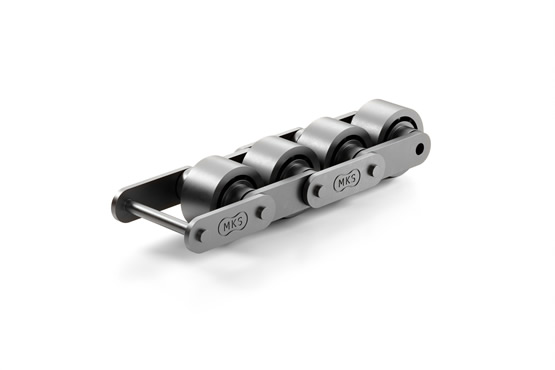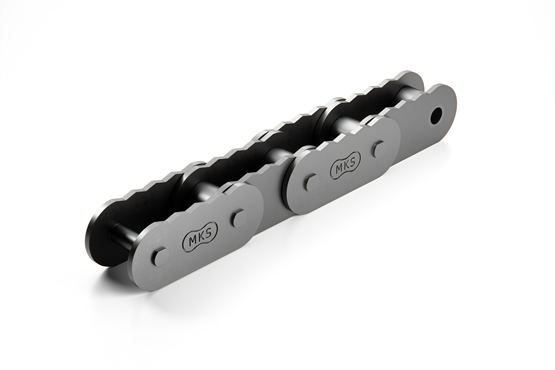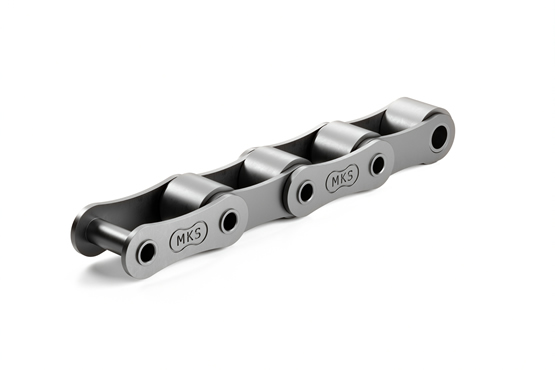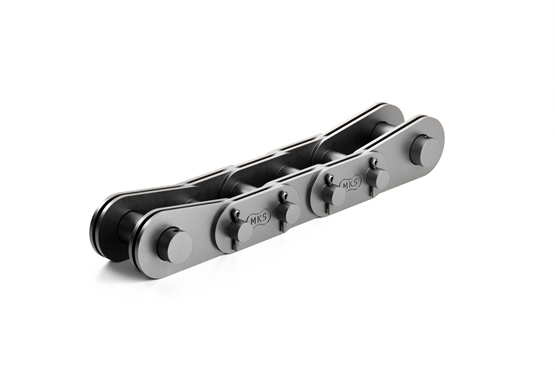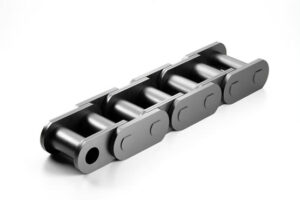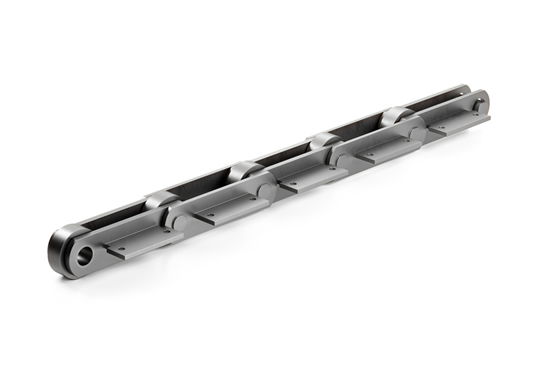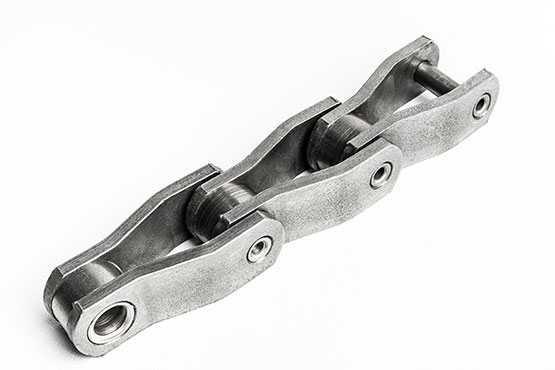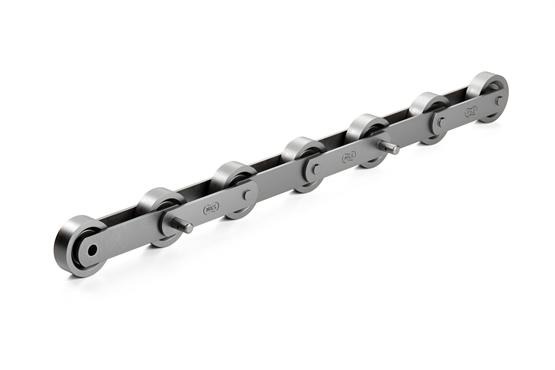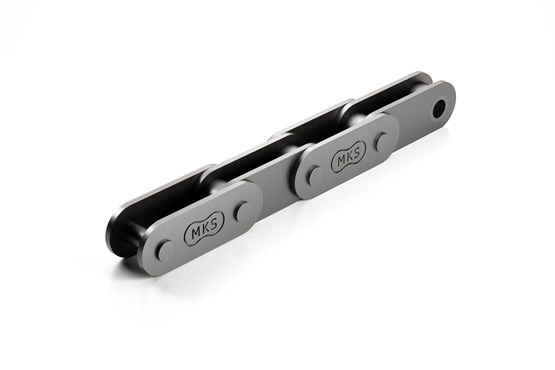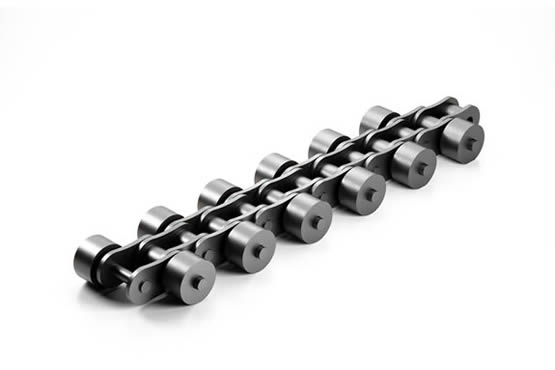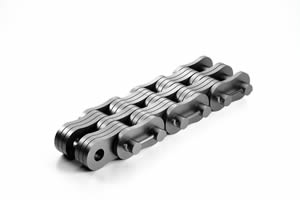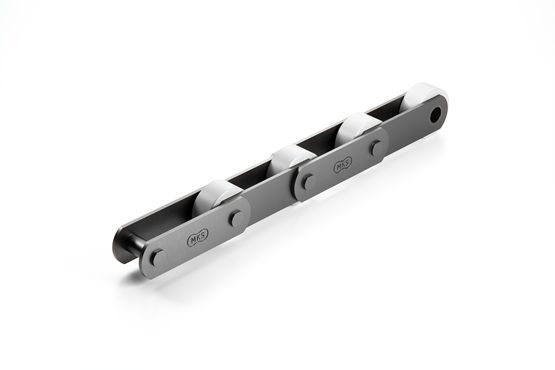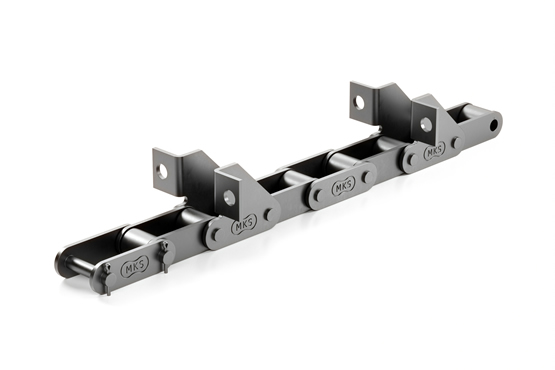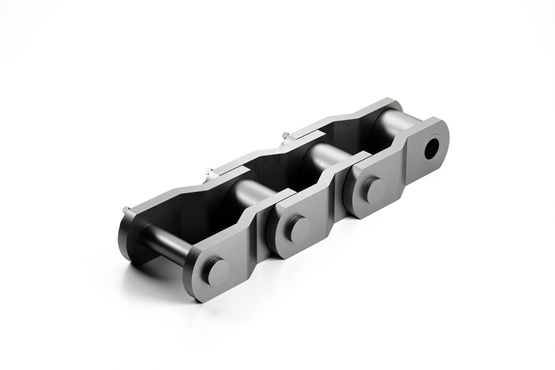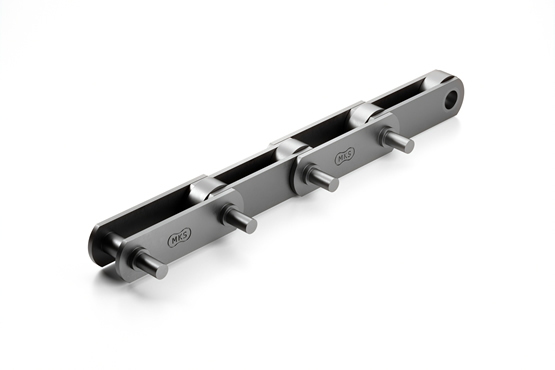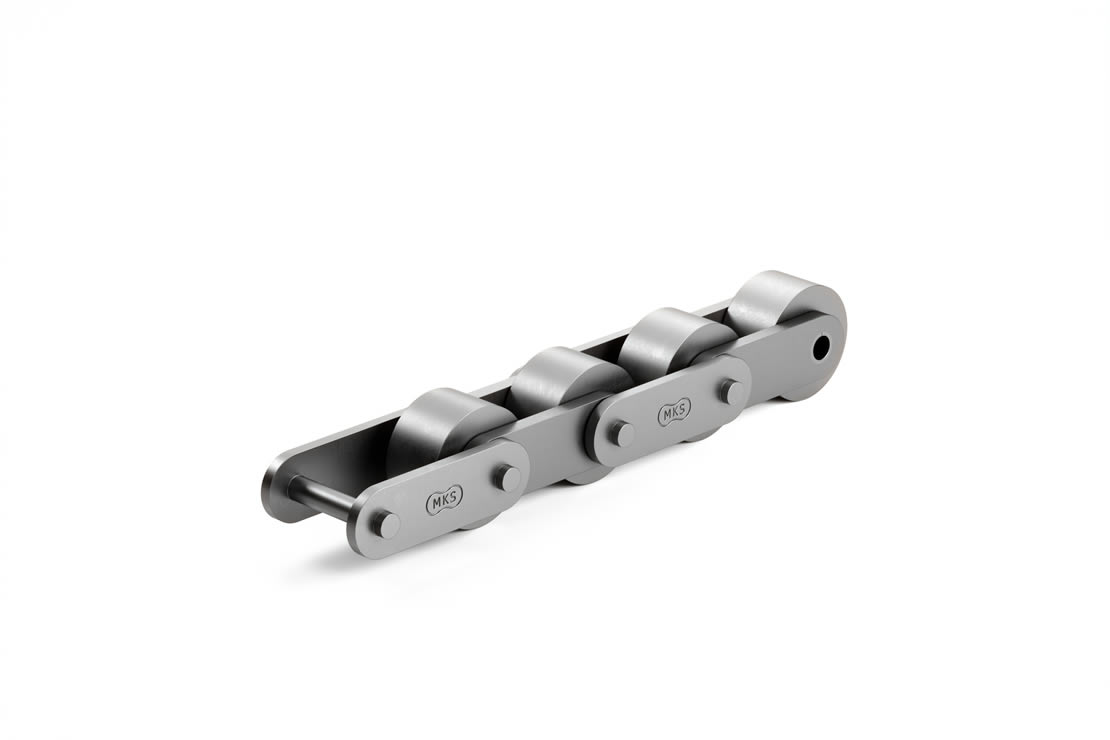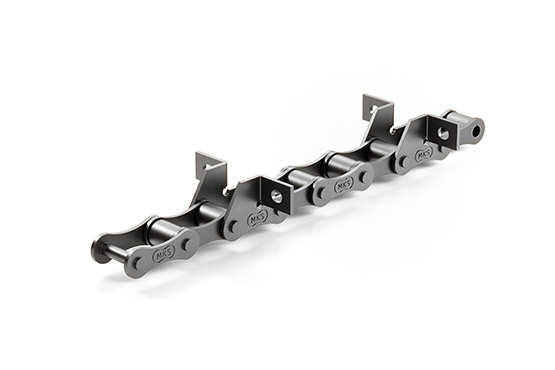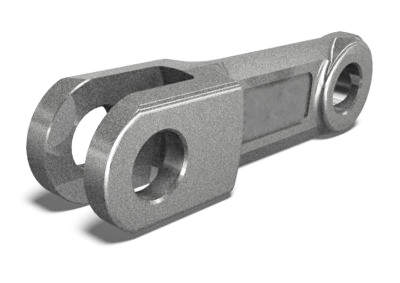INDUSTRIAL CHAINS
As Makelsan Chain, we can provide the conveyor chain and sprocket system that our customers need as a complete set.
With this we provide our customers;
- Full guarantee regarding the operability of the chain sprocket system
- Cost and time advantage by buying from a single supplier
- The advantage of easy and quick intervention in the event of a possible error
As Makelsan Chain, we produce high precision made to order industrial chains for the needs of different sectors for all special applications. We launch our products with our brand “MKS Chain“. In addition to our products range based on a sample or technical drawing , we also make new designs and produce as a result of our consultation with our customers.
Thanks to our highly graded refined steel we are responding our customers’ different needs with high quality products. We also support with rapid production and service.
In addition to our special chain and gear production, we also have 16 BS / ASA and in bigger sizes standard chain production.
What is an industrial chain?
Industrial chains consist of linked segments of durable metal, such as carbon steel , stainless steel, galvanized steel. They are available in a wide range of sizes and strengths to lift and transport materials across a diverse set of applications.
Industrial chain is the type of chain drive transmitting mechanical power from one place to another most commonly used for transmission of mechanical power on many kinds of domestic, industrial and agricultural machinery, including conveyors, wire- and tube-drawing machines.
Industrial chains are high-strength chains designed to fulfill various functions of machinery and equipment. They are generally used for load carrying, power transmission and controlling movement. The industrial chains offered by Makelsan Zincir can be customized according to specific needs and are offered in a variety suitable for use in different sectors. Thanks to its special design, these chains offer customers the opportunity to get a complete solution from a single supplier, saving cost and time.
Materials such as high quality steel are used in the production of these chains, ensuring their long life and durability. Makelsan Zincir offers a wide range of products from special production chains to standard chains and develops customized solutions for industrial needs. Used in different sectors such as agriculture, mining, construction and automotive, these chains increase the efficiency of customers’ work processes and offer the advantage of rapid intervention against possible malfunctions.
What are Industrial Chains for?
Industrial chains are important mechanical components that offer a wide range of applications. Their main functions include power transmission, material handling and controlling motion in various mechanical systems. Here are the main uses and functions of industrial chains:
Power Transmission: Chains, especially used in transmission systems, transfer engine power to other machine parts. Thanks to these chains, the rotational motion of the engine is transmitted through the chain to other gears or mechanisms. For example, in motorcycles and bicycles, chains are used to transfer pedal or engine power to the wheels.
Material Handling: Industrial chains used in conveyor systems are used to move materials from one point to another in factories, packaging plants and assembly lines. These chains are especially preferred when heavy or bulky materials need to be transported effectively.
Load Lifting and Motion Control: Used in the construction industry and heavy industry, load lifting chains are used in lifting equipment to safely lift and lower loads. These chains have the capacity to carry heavy loads thanks to their high strength.
Special Applications: Companies such as Makelsan Zincir also produce special chains for customer needs. These special chains are specially designed and manufactured for a specific application and address needs that standard chains cannot meet. For example, corrosion resistant chains made of stainless steel for acidic or corrosive environments, chains that meet hygiene requirements for the food industry fall into this category.
Industrial chains are indispensable components in many industrial sectors due to their functionality, strength and adaptability. They ensure efficient, safe and effective operation of machinery and equipment.
What is the Structure of Industrial Chains?
Industrial chains are mechanical parts designed to carry heavy loads and provide high durability. They are usually made of durable metals such as steel. The structure of chains includes parts such as links, pins and rollers. This structure increases the durability and flexibility of the chain, allowing it to carry high weights and perform reliably even in difficult conditions. Especially their resistance to temperature changes and working under heavy loads make industrial chains more efficient.
What are the Uses of Industrial Chains?
Industrial chains play critical roles in a wide range of industries and applications. Here are the main uses of industrial chains:
Production Lines and Conveyor Systems: Used in factories and production facilities to transport raw materials and products between different process stations. These chains are particularly common in assembly lines and packaging departments.
Agricultural Machinery: In the agricultural sector, industrial chains are used for power transmission and functional movements in harvesters, tractors and other agricultural implements.
Automotive Industry: Chains used on assembly lines, during the transportation and assembly of automotive parts are common in this sector.
Mining Equipment: Industrial chains are critical for material handling, excavation and other heavy-duty applications in mines and mining operations.
Food Processing: Food processing plants use stainless steel chains that comply with hygiene standards. These chains play an important role in the processing, packaging and transportation of foodstuffs.
Elevator and Load Lifting Systems: High-strength chains are used safely in load lifting, material handling and elevator systems.
Maritime and Port Management: Chains are used for the transportation of containers and other cargo on ships and in ports. They also play an important role in mooring and anchoring operations.
Forest Products and Timber Processing: Industrial chains are preferred for power transmission and material handling in logging and timber processing machines.
Airport Baggage Systems: Industrial chains are used in conveyor systems used for the transportation and sorting of baggage at airports.
Amusement and Theme Parks: Amusement park equipment such as roller coasters use chains that are specially designed for safety and performance.
The use of industrial chains is vital in almost every aspect of modern industry because of the reliability, durability and efficiency they provide.
How to Maintain Industrial Chains
Regular maintenance is important for the long life and trouble-free operation of industrial chains. During maintenance, chains need to be cleaned, lubricated and worn parts replaced. Lubrication reduces friction, preventing wear and extending the working life. In addition, chains checked at regular intervals minimize the risk of breakage or damage. Disruption of maintenance can lead to a decrease in the performance of the chain and cause unexpected malfunctions in the machines. Therefore, it is vital to follow periodic maintenance processes.
How to Assess the Durability of Industrial Chains
The durability of industrial chains depends on many factors. Factors such as the material the chain is made of, the conditions of use and the maintenance routine are decisive for durability. Steel, stainless steel and nickel-plated chains are among the highest performing types in terms of durability. The chain’s maximum load capacity and wear resistance also have an impact on its lifespan. Resistance to external factors such as temperature and chemicals in the working environment are also among the factors that determine the durability of industrial chains.
Which Factors are Important in the Design of Industrial Chains?
Some critical factors are at the forefront in the design of industrial chains. The durability of the material to be used is selected according to the environmental conditions in which the chain will be used. Materials resistant to external factors such as temperature, humidity and chemicals are preferred. Physical properties such as the length of the chain, the structure and diameter of the links are also effective factors on performance. In the design phase, appropriate properties are determined by considering the area of use of the chain. For example, chains used in the food industry are designed to meet hygiene standards, while chains used in the automotive industry are designed to withstand high temperatures.
What is the Role of Industrial Chains in Industry 4.0 Applications?
Industry 4.0 is a production model based on smart automation and data sharing technologies. Industrial chains are affected by this development and contribute to the more efficient operation of machines. Chains developed especially in line with automated systems increase the production efficiency of enterprises and minimize disruptions in the production process. Industry 4.0 applications provide an advantage in monitoring the operational status of chains and optimizing maintenance plans.
What are the Safety and Security Standards for Industrial Chains?
The safe use of industrial chains is ensured when they are manufactured in accordance with specific safety standards. International standards such as ISO and ANSI require industrial chains to undergo specific tests for safety. Chains manufactured in accordance with these standards ensure high safety in the working environment. Compliance with safety standards is essential to ensure the safety of workers, especially in hazardous work environments. In addition, safety standards improve the performance and longevity of the chain, reducing maintenance costs.
What are the Most Preferred Industrial Chain Types?
In 2024, some of the most prominent industrial chain types include roller chains, tensioned chains and stainless steel chains. While roller chains are frequently used in various transportation systems, tensioned chains are preferred in heavy industry due to their high load carrying capacity. Stainless steel chains are used in the food and pharmaceutical industries in accordance with high hygiene standards. Each type of chain is customized for different needs and is preferred according to the area of use.
Featured Industrial Chains in 2024
By 2024, smarter and integrated chain solutions have become popular in line with Industry 4.0 applications. Sensor-equipped and IoT-enabled chains collect machine operating data and provide instant notifications to the user. These innovative solutions optimize maintenance processes by making it easier to monitor the performance of machines. For example, chains with sensors report wear conditions, helping to determine in advance when it is time to repair or replace the chain. These developments are among the solutions that increase industrial efficiency.
2025 Industrial Chain Prices
By 2025, industrial chain prices are expected to increase significantly. This increase is driven by fluctuations in the price of raw materials and increasing demand for Industry 4.0 technology. As smart chain solutions become widespread, the costs of next-generation industrial chains will rise. However, when advantages such as long-lasting use and low maintenance costs are taken into account, these chains become highly advantageous in terms of investment. In particular, chains that can be integrated into automation systems provide gains to businesses by reducing costs in the long term.
Industrial Chain Features
Industrial chains are designed for a wide range of applications, from heavy industry to food processing. Their properties and construction are carefully selected to meet the specific needs for which they are used. Here are some important features and types of industrial chains:
Durability: Industrial chains are manufactured from high-strength materials, making them resistant to extreme load, impact and abrasion conditions.
Heat Treated: Many industrial chains are heat treated for increased strength and durability.
Corrosion Resistance: Materials such as stainless steel or galvanized steel are used to provide corrosion resistance, especially important in applications exposed to chemicals or weathering.
Flexibility: Chains are available in different sizes and designs, allowing them to adapt to a wide range of mechanical systems.
High Temperature Performance: Some industrial chains are designed to maintain their performance even in high temperature conditions.
Varieties
Conveying Chains: Chains used in material handling systems and are usually equipped with flat surfaces or attachments.
Drive Chains: Used in power transmission and usually located between motors and gears.
Conveyor Chains: Used especially in conveyor systems and are usually equipped with attachments or carriers.
Load Lifting Chains: Designed for lifting heavy loads and often used in lifting equipment.
Specialty Chains: Chains that are specially designed for a specific industrial need. This could be extreme temperature conditions, special load requirements or a specific chemical resistance.
The selection of industrial chains should be based on the specific requirements of the application in which they will be used. Factors such as strength, flexibility, wear resistance and operating environment play an important role in choosing the right type of chain. Companies such as Makelsan Zincir offer a variety of industrial chain solutions to meet the specific needs of customers.
2024 Industrial Chain Prices
The prices of industrial chains vary according to the type, material, dimensions and quality with which they are produced. Market conditions, such as fluctuations in raw material prices and the balance of supply and demand, can also have an impact on prices.
For up-to-date price information of industrial chains and other products, visiting the official website of Makelsan Zincir or contacting the sales representatives directly will provide you with the most accurate information. Industrial chain manufacturers such as Makelsan Zincir can help you with the most suitable chain solutions and price offers for your needs.
If we summarize industrial chains: It is known as one of the cornerstones of modern industry. With critical functions such as power transmission, load transportation and material movement, they are used in a wide range of industries from manufacturing to mining, agriculture to automotive. They stand out with their high strength, durability and flexibility. Makelsan Zincir aims to increase the productivity and occupational safety of industries by offering high quality chains suitable for specific needs. By following technological developments, the importance of industrial chains will increase even more and will continue to contribute to the industry with new areas of use. Therefore, we can say that industrial chains have a key role in the production technologies of the future.
An industrial chain is chain that has been designed specifically for a particular transmission system. It consists of a series of journal bearings that are held together by constraining link plates. Each bearing consists of a pin and a bush on which the chain roller revolves.
A chain is made by a number of links and those are connected by the help of a pin. Chains are run over a wheel named sprocket which has several amounts of teeth around the circumference of that to grip the chain, however, not all the chains need that sprocket to run over.
- The distance from the center of one pin to the center of the next pin, also known as the “pitch” of the chain.
- The diameter and width of the roller.
- Plate thickness, determined by measuring the plates from one flat side to another.
- Plate height is the dimension from the bottom to the top of the plate.
- Pin length and the outside diameter of the pin.
You can also determine the width and the pitch of an industrial chain by measuring the width of the sprocket by using a caliper and measuring from center to center where the chain roller would set between the teeth of the sprocket to find the pitch of the chain.
Measuring the pitch begins by identifying the pin of your chain. Pitch is the measurement from the center of one pin to the center of the next pin in line. The pitch helps determine the overall rated weight and strength of the roller chain.
Chain applications tend to be relatively low speeds and higher torques in comparison to belt drives. These include applications such as:
- Speed reducers for gearboxes
- Conveyor drives
- Fork lifts
Industrial Chains are used for a variety of applications from power transmission in heavy machinery to safety in lifting materials. In industry, chain is a flexible series of interconnected rigid links.
With roller chains, one end of the chain is connected to a sprocket driven by the engine where energy is being converted. The other end connects with the load to be shifted. As the chains roll smoothly around a rotating sprocket, the chain can experience wear over time, which manifests as some measure of stretching or loss of integrity. As chains age, they naturally need to be replaced. Industrial chains are one of the most commonly used drive components. But what are the advantages of using chain as your power transmission drive?
ROBUST
Industrial chain is very robust. It is very unlikely to snap during operation, and with the correct maintenance can last for years.
HIGH LEVEL OF EFFICIENCY
Industrial chain has a very high level of efficiency due to the toothed sprockets that grip the chain. This means that there cannot be any slippage, keeping efficiency levels high.
MAINTENANCE FREE OPTIONS AVAILABLE
Maintenance free industrial chains are available for use in areas which are difficult to access. This can prolong the life of the chain, as well as improving worker safety.
ATTACHMENTS AVAILABLE
Attachments such as buckets are available for conveying material.
Industrial chains consist of linked segments of durable metal, such as carbon steel , stainless steel, galvanized steel. They are available in a wide range of sizes and strengths to lift and transport materials across a diverse set of applications.
Industrial chain is the type of chain drive transmitting mechanical power from one place to another most commonly used for transmission of mechanical power on many kinds of domestic, industrial and agricultural machinery, including conveyors, wire- and tube-drawing machines.
Industrial Chain Types
We design Custom Made Chains for the specific needs of our customers and proceed to the manufacturing phase after prototype approval. In special chain production, we provide services according to the need for renewal or new line installation in the production line and produce customized solutions.
Conveyor Chains used to transport loads and bulk goods, we produce a wide variety of Conveyor Chains for use in different purposes. Bush Conveyor Chains, Rotary Api Chains, Bucket Conveyor Chains, Hollow Pin Chains are just a few of them.
We produce Scraper Chains, which enable the cargo to be transported over long distances, especially for the iron and steel, coal and mining, sand quarry sector; grain, feed, pasta, and flour industry.
We offer Standard Chains to the mechanical engineering industry, agricultural machinery and construction sector, printing machinery, textile and packaging industries, conveyor and material handling technology, food industry, logistics, timber processing and automotive manufacturing.
We offer Attachment Chains, which offer ease of use and freedom of design to manufacturers in plant and machine construction, to all plants with production lines. We produce the lugs in carbon steel, zinc, chrome plated or stainless steel.
We produce Roller Chains with Extended Pins in carbon steel, stainless steel or coated. We mount the pins in the Roller Chains, which we specially design according to the demands and needs of our customers, to the chains at the desired intervals.
We produce Corrosion Resistant Chains in galvanized or nickel-plated carbon steel or stainless steel, which can withstand high abrasion for a long time, are more durable in every respect than other types of metal and are perfect for corrosive environments.
Often used as conveyor chains or pull chains in applications requiring curves and turns, we offer Side Bow Chains to industrial laundries, high-temperature plant environments, textile, packaging, logistics, food, and beverage industries.
We produce the Accumulation Chains, which ensures smooth positioning of the transported goods and almost completely prevents shaking when the system moves and stops, for the electronics, food, timber, glass and ceramics, medical technology sectors.
We design the Saw Tooth Chains, which we produce especially for the wood industry and iron and steel industry, to be resistant to impacts so that it can carry the transported material without slipping and damaging it.
We design and manufacture Hollow Pin Chains that can be used for a wide range of industrial applications as carriers for chip conveyors, bucket elevators and roller belt systems. We can offer these chains to our customers in pairs.
Used as a load chain for high forces at low speed, we manufacture Galle Chain to be more resistant to deformation and have a relatively higher breaking strength.
We manufacture Bush Chains, also known as transmission chains, mainly for the mining industry and construction site equipment. We design these chains to have quieter running characteristics and for plants that are demanding in terms of temperature and humidity.
We produce Stainless Steel Chains, which are used in humid and anti-corrosion environments, from stainless and acid-resistant steel. We recommend these chains with lower breaking strength especially for the food industry.
Welded Steel Mill Chains, known as Rotary Chains, have been used in many different industries, such as mining and construction, where they are able to withstand heavy loads and resist wear.
We produce Escalator Chain, which is widely used in escalator plants such as subway, high-speed trains, airports, shopping malls, and large supermarkets, from carbon steel and special corrosion-resistant materials.
When our customers choose Conveyor Chains with Straight Plates for transferring the load, we support them in many aspects such as the force applied to the chain and assembly details. We produce these chains, which have flexible use and easy maintenance, within the scope of conveyor chains.
We design Chains with Outboard Roller, used in industries such as food processing and pharmaceuticals to help reduce the amount of contact between the product being transported and the pallets on which it is loaded, to be long-lasting, quiet, and trouble-free.
We manufacture Leaf Chains with greater tensile strength than roller chains, especially for heavy-duty applications. We offer these chains as counterweight chains for lifting or balancing applications such as elevator and furnace doors, and forklift masts.
We produce Chains with Plastic Rollers, which are preferred for carrying light and sensitive loads, for environments and loads that do not want noise and vibration. Lightweight and easy to install, these chains are specially designed for environments with chemicals, high temperatures, or where cleanliness is important.
We produce Agricultural Chains with high abrasion resistance, which are known for their robustness and durability, from carbon steel depending on the need. We diversify these special chains for the agricultural sector according to different usage areas.
Able to withstand heavy loads and resistant to abrasion, we offer Rotary Chains to the iron and steel industry, asphalt industry, cement industry, chemical industry, sugar industry, wood industry, heavy lifting systems, and pipe transportation plants.
We produce these chains in carbon steel, stainless steel or coated. We mount the pins in the Extended Pin Chains, which we specially design according to the demands and needs of our customers, to the chains at the desired intervals.
Transmission chains, also known as drive chains, enable the shaft to move both vertically and horizontally according to the engine. This industrial chain type, which can transfer the engine power to different systems as a result of the joint work of the gear and chain, is preferred for being stainless, robust, flexible, and long-lasting.
Our elevator chains are manufactured to excel in demanding environments, ensuring they can handle heavy loads and withstand challenging conditions by demonstrating great tensile and fatigue strength in industries such as cement and agriculture. Also, they keep your operations running smoothly to deliver consistent and efficient performance in your operation area.
Forged chains and sprockets are key mechanical components used to transfer motion and power between different parts of machinery. A sprocket is a wheel with teeth that engage with a chain, allowing the transmission of rotary motion between shafts. Chains, typically made from interlinked metal segments, are forged to enhance their durability and strength.
Mining chains is a term used to describe the biological and ecological cycles of various minings and elements, especially metals, in a region or ecosystem.

